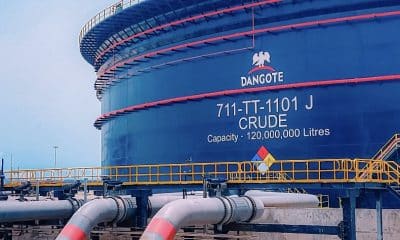Nigeria News
Federal Government Issues 47 Refinery Licenses

The Federal Government has issued 47 Licenses to Establish (LTE) and 30 Licenses To Construct (LTC) refineries in one year.
The Nigerian Midstream and Downstream Petroleum Regulatory Authority (NMDPRA) disclosed this achievement during the sixth “Meet-the-Press” briefing in Abuja on Tuesday.
The Chief Executive Officer of NMDPRA, Farouk Ahmed, confirmed that the 47 LTEs alone represent nearly three million barrels per day (bpd) of refining capacity.
Providing a detailed breakdown of the issued licenses, Ahmed stated, “We have issued 47 LTEs translating to 1.75 million bpd and 30 LTCs translating to 1.23 million bpd. Currently, only four plants hold LTC with a steady output of 27,000 bpd.”
He went on to highlight the progress of key refining projects, including the Dangote Petroleum Refinery, which boasts an impressive capacity of 650,000 bpd.
Other notable projects include AIPCC Energy’s 30,000 bpd plant and Waltersmith’s second train, which will have a capacity of 5,000 bpd.
Ahmed also provided insights into the current refining landscape in Nigeria. According to him, six licensed private refineries and four public ones are producing a total of 1.12 million bpd. Additionally, private plants contribute 679,500 bpd, with Dangote’s single-train refinery leading with 650,000 bpd.
The list of operational modular refineries includes Aradel (11,000 bpd), OPAC (10,000 bpd), Waltersmith (5,000 bpd), Duport Midstream Limited (2,500 bpd), and Edo Refining and Petrochemicals Company Limited (1,000 bpd).
He also pointed out the contribution of publicly owned refineries operated by the Nigerian National Petroleum Company Limited (NNPC).
These refineries add another 445,000 bpd to the country’s refining capacity, with plants in Port Harcourt (150,000 bpd), Warri (125,000 bpd), Kaduna (110,000 bpd), and the old Port Harcourt plant (60,000 bpd).
“These developments underline our commitment to reducing dependency on imported refined products,” Ahmed emphasized.
Looking ahead, Ahmed assured that ongoing efforts are in place to further expand Nigeria’s domestic refining capacity. He noted that this expansion would not only help reduce import dependency but also support economic growth through job creation and enhanced energy security.
The NMDPRA’s recent licensing efforts also include approvals for modular refineries in Edo, Delta, and Abia states, which are expected to add an additional 140,000 bpd upon completion.










